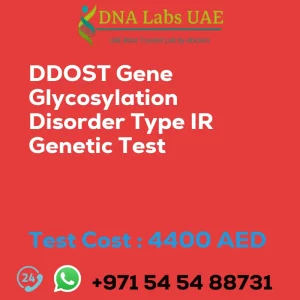LARS2 Gene Hydrops lactic acidosis and sideroblastic anemia Genetic Test
At DNA Labs UAE, we offer the LARS2 Gene Hydrops lactic acidosis and sideroblastic anemia Genetic Test for AED 4400.0. This test helps in diagnosing and understanding the symptoms of Hydrops, lactic acidosis, and sideroblastic anemia.
Test Details
The LARS2 gene is associated with a rare genetic disorder known as Hydrops, lactic acidosis, and sideroblastic anemia (HLASA). This condition is characterized by the presence of three main features:
- Hydrops fetalis: abnormal fluid accumulation in the fetus, often in the abdomen or chest
- Lactic acidosis: buildup of lactic acid in the body, causing symptoms like weakness, fatigue, and abdominal pain
- Sideroblastic anemia: impaired production of healthy red blood cells, leading to symptoms like fatigue, pale skin, and shortness of breath
Test Method and Components
The LARS2 Gene Hydrops lactic acidosis and sideroblastic anemia Genetic Test is performed using NGS (Next-Generation Sequencing) technology. This method allows for the simultaneous analysis of multiple genes to identify genetic variations or mutations.
To conduct the test, we require a blood sample, extracted DNA, or one drop of blood on an FTA Card. The test results will be delivered within 3 to 4 weeks.
Pre Test Information
Prior to the test, it is important to provide the clinical history of the patient who is undergoing the LARS2 Gene Hydrops, lactic acidosis, and sideroblastic anemia NGS Genetic DNA Test. Additionally, a Genetic Counselling session will be conducted to draw a pedigree chart of family members affected by this condition.
Benefits of the Test
The LARS2 Gene Hydrops lactic acidosis and sideroblastic anemia Genetic Test can help in confirming a diagnosis, providing information on disease prognosis, and guiding appropriate treatment and management options. By identifying mutations in the LARS2 gene, this test aids in understanding the underlying cause of HLASA.
If you suspect that you or a family member may have Hydrops, lactic acidosis, and sideroblastic anemia, consult with a General Physician to discuss the possibility of undergoing the LARS2 Gene Hydrops lactic acidosis and sideroblastic anemia Genetic Test. Our Genetics Test Department is equipped to handle all inquiries and provide comprehensive testing services.
| Test Name | LARS2 Gene Hydrops lactic acidosis and sideroblastic anemia Genetic Test |
|---|---|
| Components | |
| Price | 4400.0 AED |
| Sample Condition | Blood or Extracted DNA or One drop Blood on FTA Card |
| Report Delivery | 3 to 4 Weeks |
| Method | NGS Technology |
| Test type | Metabolic Disorders |
| Doctor | General Physician |
| Test Department: | Genetics |
| Pre Test Information | Clinical History of Patient who is going for LARS2 Gene Hydrops, lactic acidosis, and sideroblastic anemia NGS Genetic DNA Test A Genetic Counselling session to draw a pedigree chart of family members affected with Hydrops, lactic acidosis, and sideroblastic anemia |
| Test Details |
The LARS2 gene is associated with a condition called Hydrops, lactic acidosis, and sideroblastic anemia (HLASA). HLASA is a rare genetic disorder characterized by the presence of three main features: hydrops fetalis, lactic acidosis, and sideroblastic anemia. Hydrops fetalis refers to abnormal fluid accumulation in the fetus, usually in the body cavities such as the abdomen or chest. It can cause severe complications and is often fatal before or shortly after birth. Lactic acidosis is a condition characterized by the buildup of lactic acid in the body. It occurs when there is an imbalance between the production and clearance of lactic acid. Symptoms can include weakness, fatigue, rapid breathing, nausea, and abdominal pain. Sideroblastic anemia is a type of anemia characterized by the impaired production of healthy red blood cells. It occurs when the bone marrow is unable to incorporate iron into the hemoglobin molecule, leading to the formation of abnormal red blood cells. Symptoms can include fatigue, weakness, pale skin, and shortness of breath. NGS (Next-Generation Sequencing) genetic testing is a method used to analyze multiple genes simultaneously for genetic variations or mutations. In the context of HLASA, NGS genetic testing can be used to identify mutations in the LARS2 gene that are responsible for causing the condition. This type of testing can help in confirming a diagnosis, providing information on disease prognosis, and guiding appropriate treatment and management options. |








